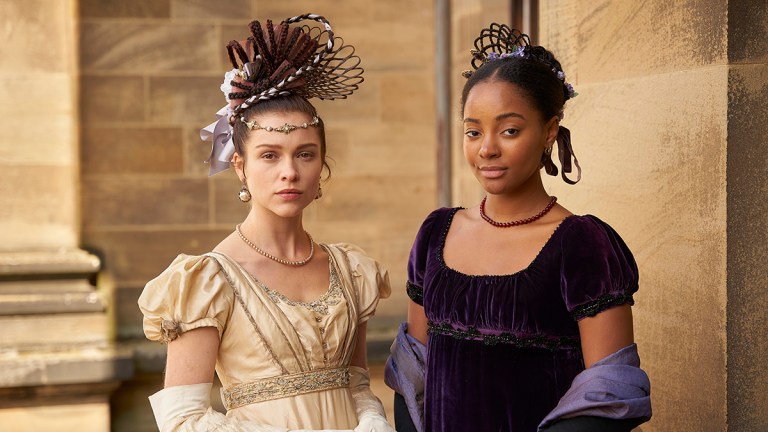The Confessions of Frannie Langton Review: Quality Drama with Mystery and Heart
Adapted from Sara Collins’ novel, The Confessions of Frannie Langton is a queer period drama with a Black woman at the core.

ITVX is the new name for ITV Hub, and with that name change, we get a whole new batch of streaming content. The Confessions of Frannie Langton, an adaptation of Sara Collins’ 2019 novel of the same name, tells the tragic story of a former slave who is sent from Jamaica to London and ends up working for a wealthy couple, where she falls in love with her mistress.
Set in Georgian London, the show is a beautiful, painful and queer story. It’s a British period drama which puts a Black woman at the helm – while defying the stereotypical former slave figure often painted in period dramas. Frannie (Karla-Simone Spence) is educated, well-read and outspoken, but more importantly, she has the ability to fall in love.
When we meet Frannie , she is being dragged from her lover’s bed and arrested for the murder of the Benhams – her master and mistress (Stephen Campbell Moore and Sophie Cookson). Over the course of four episodes, and as Frannie pleads that she is not responsible for their murder, we get to see Frannie’s life through flashbacks which hit us with the brutal force of reality for Black people in the Georgian era. It tests our knowledge of the British Empire and what we may have thought we knew about Black Britain at the time.
Frannie’s narrative is told in two timelines, one as she sits in jail trying to remember the events that led to her masters’ murder and the other as she gives us a look into her past: her childhood on the Paradise plantation in Jamaica, her arrival to England and how she ended up being accused of murder. The historical aspect makes this show even more intriguing as Frannie’s story depicts how there were loopholes involved in the slave trade being abolished, which allowed slaves already working for families to continue working for them without pay.
When Frannie expresses, “all I wanted was to have the pages of a book between my fingers”, it talks to the heart of this story, which aims to show what happens when society deems certain people to be inferior. The experimentation of Frannie’s former enslaver John Langton (Steven Mackintosh), who wanted to prove African people were not human, is hard to watch especially when you see the obvious repercussions it has had on Frannie and those around her, but this painful storyline is a crucial part of what makes this show so powerful.
The show eloquently depicts what it means to be treated as inferior, whether that’s down to race or sex. The story of Marguerite Benham shows the inferiority women faced in comparison to men as it depicts how despite her being the wife of an aristocrat, she also had no say in how her life was. Likewise, the anglicisation of the name of the boy the Benhams adopt, from Olaudah to Laddie (Patrick Martins) because George Benham said his name sounded too African shows the nuances involved in racism even after the ending of the slave trade. Moreover, Marguerite describing how she “got him” after she had a miscarriage and Frannie’s subsequent flashback to when she was taken from her mother and “trained” under a white woman depicts how the abolishment of slavery didn’t end their trauma and ownership, it was only the beginning of a new kind.
Spence’s portrayal of Frannie is nothing short of incredible. She’s a woman who will not be stereotyped and is equal parts strong-headed and vulnerable. Her standout moment has to be when she confronts John Langton and slaps him after he reveals he’s dying: “I should have been the one to kill you and I should have done it long before now.” Likewise, her chemistry with Cookson as Frannie’s mistress and lover is strong. Amarah-Jae St. Aubyn’s portrayal of brothel owner Sal, especially in the last two episodes, is spectacular too. Sal acts as a big sister to the struggling Frannie but her own story, which is never really explored in much detail but really deserves its own show, is a fascinating look into how many Black women were able to be independent by becoming sex workers. Not in an exploitative way but in allowing them to be self-sufficient and have control over their lives, weaving a story about Black women beyond slavery.
One of the most powerful things this adaptation does is depict hidden histories. It explores how certain histories such as those of women and Black people have tended to get lost in the background but with Frannie’s story the show hopes to provide a different angle of history that we haven’t heard enough about.
The queer love story between Frannie and Marguerite shows viewers everything they’ve been missing from the period drama genre so far as well as everything they love about the gothic genre. There are strong Daphne Du Maurier Rebecca vibes here, with murder and the sinister housekeeper treating the main character poorly. Furthermore, the love story is told at just the right pace as we move through Frannie and Marguerite’s relationship from their initial connection to the lust that appears between the two when Frannie tops up Marguerite’s bath. Frannie describes: “All the things we aren’t supposed to feel, need, want.” The forbidden nature of their relationship, alongside the eroticism involved in the build up to their romance and increasing intimacy, feels natural within this period drama.
By the end of the series with all its twists and turns you may end up with whiplash as you try to figure out the truth of whether or not Frannie Langton can be a murderer. But regardless of that, the show’s greatest element is that it highlights stories that have been hidden for way too long.
The Confessions of Frannie Langton is available to stream now on ITVX.
